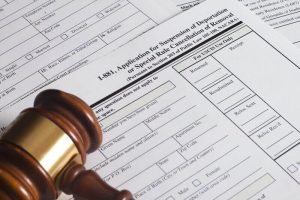Becoming a permanent resident of the United States is a significant milestone for many immigrants. A Green Card offers stability, work opportunities, and a pathway to citizenship. However, choosing the proper process to obtain one can make all the difference.
This article breaks down the two main options: Adjustment of Status and Consular Processing. Knowing what to expect is essential, whether you live in the U.S. or are applying from abroad. This guide will explore both options, compare them, and explain how an immigration lawyer can assist.

Understanding Adjustment Of Status & Consular Processing
Two primary methods for obtaining a Green Card are Adjustment of Status (AOS) and Consular Processing. Understanding each process and its workings under U.S. immigration law helps you make informed decisions.
Adjustment Of Status
Adjustment of Status is applying for a Green Card while physically present in the U.S. You do not need to return to your home country to complete Visa processing. To qualify, you must have an approved immigrant petition, meet eligibility requirements, and have a Visa available (if applicable). The process includes the following steps:
- Confirm your eligibility for a Green Card based on your immigration category.
- File an immigrant petition or ensure an approved one exists.
- Check if a Visa is available for your category.
- Submit Form I-485, Application to Register Permanent Residence or Adjust Status.
- Attend your biometric appointment and interview, if required.
- Respond to any USCIS requests for additional evidence before receiving a final decision.
Completing the AOS process allows you to become a lawful permanent resident without leaving the U.S. Ensuring accuracy in your application and responding to USCIS requests promptly can help keep your case on track.
Consular Processing
Consular processing is the method for applying for a Green Card outside the United States. You must have an approved immigrant petition and an available Visa number. The application is completed at a U.S. consulate or embassy. It involved key steps, including:
- Confirm your eligibility and determine your immigration category.
- Submit an immigrant petition and wait for approval.
- When a Visa becomes available, receive notification from the National Visa Center (NVC).
- Submit the required forms and supporting documents.
- Attend a Visa interview at a U.S. consulate or embassy.
- Upon approval, enter the U.S. with your immigrant Visa and receive your Green Card.
This option requires travel and careful preparation to avoid delays or denials. Both processes lead to the same goal, but key differences determine which suits a particular case. Understanding these distinctions will help you choose the proper path for your journey.
Key Differences Between The Two
Your choice between Adjustment of Status and Consular Processing depends on essential factors. Knowing these distinctions can help you choose the most suitable option for your case.
Location
AOS allows you to stay in the U.S. while processing your Green Card application. You will undergo an interview at a local USCIS office instead of leaving the country. Consular Processing, however, requires you to apply from outside the U.S. and attend an interview at a U.S. consulate or embassy in your home country.
Processing Time
AOS may take longer due to USCIS backlogs and local office interview schedules. Cases can also experience delays, especially in high-volume USCIS field offices. Consular Processing is often faster because it involves fewer agencies and steps.
The National Visa Center (NVC) processes Consular cases and schedules interviews based on consular availability. However, wait times vary by country. Some U.S. consulates have longer processing times due to demand. AOS processing times also fluctuate, making it essential to check USCIS timelines regularly.
Travel Considerations
If you apply through AOS, you must remain in the U.S. while your case is pending. Leaving without an approved travel permit (Advance Parole) can lead to the denial of your application. Travel restrictions apply until USCIS grants permission.
On the other hand, Consular Processing requires travel abroad for the Visa interview. This means you must plan for potential consular delays and travel expenses. You can enter the U.S. as a permanent resident if your Visa is approved. If additional review is needed, your case may experience delays while you remain outside the U.S.
Risk Of Denials
AOS applicants can often respond to USCIS concerns by submitting additional documents or attending a follow-up interview. If USCIS asks for a Request for Evidence (RFE), you can provide missing information before making a final decision.
Consular Processing does not always offer the same flexibility. You may have to reapply or seek a waiver if your Visa application is denied. Some denials result in inadmissibility issues that require additional legal steps. Proper preparation before the interview reduces the risk of delays or rejection.
Both processes lead to the same goal, but choosing the right one depends on your circumstances. A skilled immigration attorney can help you assess your eligibility, prepare your application, and avoid costly mistakes. Legal guidance ensures you understand your options and take the proper steps for a successful outcome.
The Need For Immigration Attorneys
Applying for a Green Card involves strict requirements, paperwork, and deadlines. Errors or missing documents can result in delays, denials, or even inadmissibility issues. An immigration attorney ensures your application is complete, accurate, and submitted correctly. Here’s how a skilled lawyer can help you:
- Assess your eligibility: Based on your situation, they determine whether AOS or Consular Processing is the right option.
- Ensure proper documentation: Lawyers help gather and submit the required forms, supporting evidence, and financial documents.
- Prepare you for interviews: Attorneys provide guidance on common questions asked during USCIS or consular interviews.
- Address legal issues: Legal professionals assist with inadmissibility waivers or complications that may affect your case.
Having legal support reduces the risk of errors and strengthens your application. An experienced attorney can guide you through the process and improve your chances of approval. Additionally, they can answer common questions to help you clarify requirements, avoid mistakes, and understand what to expect.
Answering Frequently Asked Questions (FAQs)
Applying for a Green Card involves many steps, and applicants often have concerns about eligibility, costs, and denials. Understanding the legal requirements and available options can help you make wise decisions. Below are answers to some common questions regarding Adjustment of Status and Consular Processing.
Can You Apply For AOS If You Have A Pending Asylum Case?
It depends on your specific circumstances. Generally, asylum applicants are not eligible for AOS unless they meet certain conditions. These may include having an approved petition that provides a different pathway to a Green Card, such as marriage to a U.S. citizen or an employment-based petition.
Are There Additional Fees Associated With Consular Processing?
Yes, Consular Processing requires applicants to pay multiple fees. These include immigrant Visa fees, medical examinations, and other consular charges. The exact amount depends on the U.S. consulate. Additional expenses, such as travel costs and document translations, may apply.
Can You Appeal A Visa Denial From A U.S. Consulate?
Visa denials from U.S. consulates generally cannot be appealed. However, some cases allow for additional review or reapplication. If a Visa is denied under the Immigration and Nationality Act (INA) Section 221(g), further processing is required. The consular officer may need more documents, security checks, or additional verification.
If the denial is due to inadmissibility under other INA provisions, you may qualify for a waiver of inadmissibility. The waiver type depends on the reason for denial and requires a separate application.
A qualified immigration law firm answers these questions and provides legal guidance based on your case. Skilled legal counsel prepares your application accurately, improves your chances of success, and helps you prevent delays or complications.
Houston Texas Immigration Lawyers: Your Legal Guide
At Houston Texas Immigration Lawyers, we help individuals navigate the Green Card process through Adjustment of Status (AOS) and Consular Processing. Our team ensures you receive personalized legal strategies based on your immigration status and goals.

We handle document preparation, USCIS filings, and interview guidance to help clients avoid common mistakes that lead to delays or denials. Our attorneys assist with Visa availability checks, responses to Requests for Evidence (RFEs), and consular interview preparation.
Understanding immigration law can be challenging, but the proper legal support makes a difference. Consulting with our firm early helps ensure a smoother process and increases the likelihood of success.
Adjustment of Status and Consular Processing are the primary ways to obtain a Green Card. The right choice depends on your location, eligibility, and immigration history. AOS allows you to apply in the U.S., while Consular Processing requires you to complete the process abroad.
Key differences include processing times, travel requirements, and risk of denial. Both options lead to the same goal, but careful preparation is necessary. At Houston Texas Immigration Lawyers, we help improve streamline the process for a successful application.




